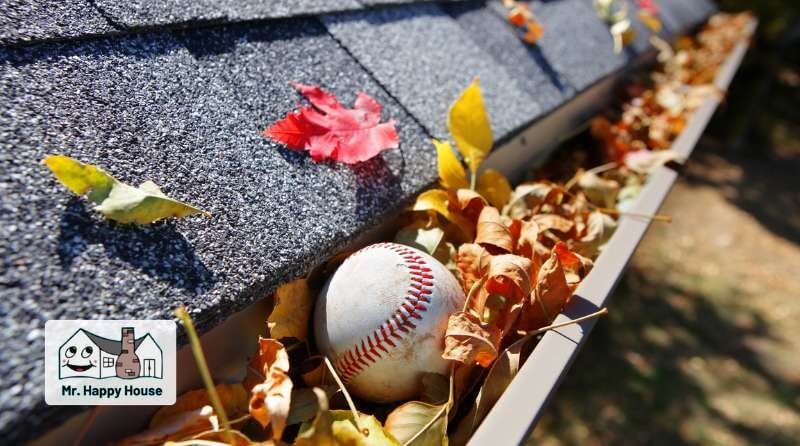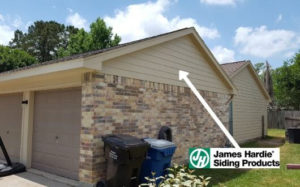
Best GAF Certified Roofers in The Woodlands, TX – Quality Roof Replacement, Gutters & Siding
Best GAF Certified Roofers in The Woodlands, TX – Quality Roof Replacement, Gutters & Siding Best GAF Certified Roofers in The Woodlands, TX – Quality

Do you have clogged gutters on your home? Do you also have leaking in your ceiling? With this in mind, you may be wondering, can clogged gutters cause ceiling leaks?
In this article, we will explore the connection between clogged gutters and ceiling leaks in homes. Gutters play a crucial role in managing rainwater and preventing water damage your roof, soffits, structure and the interior of your house. When gutters become clogged or neglected, it can lead to a range of issues, if this issue is left unresolved, this can lead to leaks in your ceiling.
Understanding the relationship between gutters and ceiling leaks is essential if you’re a homeowner looking to protect and maintain the value of your home. Let’s get into this important topic and discover how keeping your gutters clean and well-maintained can prevent costly and troublesome ceiling leaks.
Before we dive into the connection between clogged gutters and ceiling leaks, it’s essential to grasp the fundamental role that gutters play in your home’s structural integrity and overall well-being.
Gutters are not just decorative additions to your roof; they serve a vital function in managing rainwater and preventing it from running off in other areas in your home, but most importantly your foundation.
The role of gutters in water management is crucial for protecting your home from water-related damage and maintaining its structural integrity. Gutters are a key component of your home’s exterior that serve several important functions in effectively managing rainwater. Here’s an explanation of the role of gutters in water management:
Rainwater Collection: The primary purpose of gutters is to collect rainwater that flows down your roof. As rain falls, it runs off the roof’s surface and into the gutters. Without gutters, this water would simply fall to the ground, potentially causing erosion and issues around your home’s foundation.
Direction of Water Flow: Gutters provide a controlled pathway for rainwater to flow. This directs water away from vulnerable areas of your home, such as the foundation, exterior walls, and windows. Proper water flow prevents water from infiltrating these areas, which can cause damage over time. The last thing you want in your gutters is for water runoff to just be standing still in your gutters.
Prevention of Soil Erosion: Gutters help prevent soil erosion around your home. When rainwater is properly channeled away from the foundation, it reduces the risk of soil erosion, which can affect the stability of your home’s foundation and landscaping.
Foundation Protection: By directing rainwater away from your home’s foundation, gutters play a vital role in preventing moisture from seeping into the foundation and basement. This is essential for maintaining the structural integrity of your home and preventing issues like cracks and mold growth.
Siding and Exterior Protection: The water flowing off your roof can be forceful, especially during heavy rain. Gutters ensure that this water doesn’t splash against your home’s siding and exterior walls. Without gutters, the force of the falling water can cause exterior paint or siding to deteriorate more rapidly.
Prevention of Basement Flooding: In addition to foundation protection, gutters also help prevent basement flooding. When rainwater is effectively managed, it is less likely to infiltrate your basement, reducing the risk of water damage and mold growth.
In summary, gutters are a critical component of water management for your home. They collect and direct rainwater away from your home, preventing a range of issues, including water damage, foundation problems, and structural damage. Properly maintained gutters are essential for preserving the overall well-being and value of your home.
Neglecting your gutters can have far-reaching consequences for your home, both interior and exterior. When gutters are not properly maintained, they can become clogged with leaves, debris, and dirt. This leads to several potential issues:
Water Damage: Clogged gutters can cause rainwater to overflow and accumulate around your home’s foundation. This can result in water seeping into your attic, leading to structural damage, mold growth, and other costly problems. This is what can lead to ceiling leaks.
Roof Damage: When gutters are clogged, rainwater may back up onto your roof, potentially causing leaks and rotting. This can lead to the need for extensive roof repairs or replacements.
Landscape Erosion: Overflowing water from clogged gutters can erode the soil around your home, damaging your landscaping and potentially creating a mess in your yard.
Attracting Pests: Standing water in clogged gutters can attract pests like mosquitoes and other insects. In some cases, it can even provide a breeding ground for pests, further affecting your home’s comfort and safety.
Ceiling and Interior Damage: The most relevant consequence to this article’s topic is the potential for water to infiltrate your home’s interior. Neglected gutters can allow water to seep into your walls and ceiling, leading to unsightly stains, structural damage, and even dangerous mold growth.
Reduced Curb Appeal: Overflowing or clogged gutters can create an unsightly mess, affecting your home’s curb appeal and potentially reducing its market value.
In summary, the consequences of neglected gutters can be significant, ranging from costly repairs to potential health hazards. Regular gutter maintenance is essential for preventing these issues and ensuring your home remains in good condition.
When gutters become clogged with leaves, debris, and dirt, they are unable to perform their primary function effectively, which is to channel rainwater away from your roof and home. Instead, the debris blocks the flow of water within the gutters.
Overflow: With clogged gutters, rainwater has nowhere to go. As a result, it overflows from the gutters rather than being directed through the downspouts and away from your home. This overflow can lead to cascading water issues:
Water Seeping Under Roofing: Overflowing rainwater may seep under your roofing shingles or tiles. This is especially problematic during heavy or prolonged rainfall. Water can penetrate through gaps and vulnerable areas in your roof’s structure and then cause ceiling leaks.
Interior Infiltration: Once water breaches your roof’s protective barrier, it can enter the attic or upper part of your home. From there, it may continue its downward path, infiltrating the ceiling and walls.
Ceiling Leaks: The infiltrated water can create stains, weaken the ceiling material, and eventually lead to leaks in your ceiling. These leaks can manifest as visible water spots, bulging or sagging ceiling surfaces, or even more severe structural damage.
Mold and Mildew Growth: In addition to the immediate physical damage, the moisture from ceiling leaks can create ideal conditions for mold and mildew growth. This not only damages your home further but also poses health risks to occupants.
Compounding Damage: Over time, if the issue is not addressed, the ongoing moisture can lead to more extensive structural damage, higher repair costs, and potential health concerns.
In summary, clogged gutters disrupt the proper drainage of rainwater, causing overflow and subsequent water infiltration into your home. This infiltration can lead to ceiling leaks, compromising the integrity and safety of your home. Regular gutter maintenance is crucial to prevent this sequence of events and protect your property from water-related damage.
Preventing your gutters from clogging up is essential to avoid potential ceiling leaks and other water-related issues in your home. Here are some effective preventive measures to keep your gutters clear and functioning properly:
The most crucial step in preventing gutter clogs is to clean your gutters regularly. Remove leaves, twigs, dirt, and debris that accumulate in the gutters and downspouts. Cleaning should be done at least twice a year, preferably in the spring and fall, but more frequently if you have overhanging trees.
Gutter guards are designed to keep debris out while allowing water to flow freely into the gutters. There are various types of gutter guards available, here at Mr. Happy House, if you’re located in The Woodlands or Northwest Houston area, we have a special type of gutter cover called LeaFree’s that works seamlessly in collecting water runoff from your roof without debris buildup.
Overhanging branches can deposit leaves and debris directly into your gutters. Trim back branches that hang over your roof to reduce the amount of organic material that enters the gutters.
Make sure that downspouts are clear and free of debris that could pile up and clog it up. They should direct water away from your home’s foundation. Use downspout extensions to carry water even farther from your house to prevent foundation issues.
Regularly inspect your gutters for any signs of leaks, rust, or damage. Repair or replace damaged sections promptly to prevent water from escaping the gutters and infiltrating your home.
Leaves, twigs, and other debris can accumulate on your roof which can lead to water buildup in your gutters. Regularly remove debris from your roof to prevent it from washing into your gutters during rainfall.
Ensure that your gutters are installed with a slight downward slope toward the downspouts. This helps water flow smoothly and reduces the risk of standing water and clogs.
Periodically have your gutters inspected by a professional like Mr. Happy House. They can identify potential issues and provide maintenance or repair recommendations.
By following these preventive measures, you can reduce the likelihood of gutter clogs and the associated problems, including ceiling leaks. Regular maintenance and attention to your gutters are essential for protecting your home and preserving its value.
In the concluding section of this article, we’ll summarize the key points and takeaways regarding the connection between clogged gutters and ceiling leaks. You’ll gain a comprehensive understanding of the importance of gutters, their role in water management, the consequences of neglect, and how clogged gutters can lead to ceiling leaks.
We’ll also highlight the signs of gutter problems, preventative measures, and the impact on your home’s value. Armed with this knowledge, you can protect your home, avoid costly repairs, and maintain or increase the value of your property by properly caring for your gutters.
Our Services:












Schedule an Estimate Today!

Best GAF Certified Roofers in The Woodlands, TX – Quality Roof Replacement, Gutters & Siding
Best GAF Certified Roofers in The Woodlands, TX – Quality Roof Replacement, Gutters & Siding Best GAF Certified Roofers in The Woodlands, TX – Quality

Are Gutters Part of the Roofing System?
Are Gutters Part of the Roofing System? Are Gutters Part of the Roofing System? When it comes to home maintenance, gutters often seem like a

Why James Hardie is The Best Option for Home Siding
Why James Hardie is The Best Option for Home Siding Why James Hardie is The Best Option for Home Siding James Hardie stands out whether











